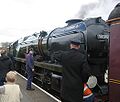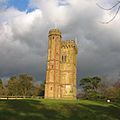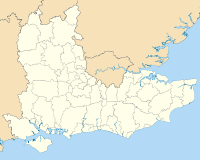Portal:South East England
The South East England Portal

South East England is one of the nine official regions of England in the United Kingdom at the first level of ITL for statistical purposes. It consists of the counties of Buckinghamshire, East Sussex, Hampshire, the Isle of Wight, Kent, Oxfordshire, Berkshire, Surrey and West Sussex. Major towns and cities in the region include Brighton and Hove, Canterbury, Milton Keynes, Southampton, Portsmouth, Slough, Reading and Oxford.
South East England is the third-largest region of England, with a land area of 19,072 square kilometres (7,364 sq mi), and is also the most populous with a total population of over nine million. The region contains eight legally chartered cities: Brighton and Hove, Canterbury, Chichester, Milton Keynes, Oxford, Portsmouth, Southampton and Winchester. The region's close proximity to London has led to South East England becoming a prosperous economic hub with the largest economy of any region in the UK, after London. The region is home to Gatwick Airport, the UK's second-busiest airport, and Heathrow Airport (the UK's busiest airport) is located adjacent to the region's boundary with Greater London. The coastline along the English Channel provides numerous ferry crossings to mainland Europe.
The region is known for its countryside, which includes two national parks: the New Forest and the South Downs, as well as the North Downs, the Chiltern Hills and part of the Cotswolds. The River Thames flows through the region and its basin is known as the Thames Valley. It is also the location of a number of internationally known places of interest, such as HMS Victory in Portsmouth, Cliveden in Buckinghamshire, Thorpe Park and RHS Wisley in Surrey, Blenheim Palace in Oxfordshire, Windsor Castle in Berkshire, Leeds Castle, the White Cliffs of Dover and Canterbury Cathedral in Kent, Brighton Palace Pier, and Hammerwood Park in East Sussex, and Wakehurst Place in West Sussex. The region has many universities; the University of Oxford is the oldest in the English-speaking world, and ranked among the best in the world.
South East England is host to various sporting events, including the annual Henley Royal Regatta, Royal Ascot and The Derby, and sporting venues include Wentworth Golf Club and Brands Hatch. Some of the events of the 2012 Summer Olympics were held in the south east, including the rowing at Eton Dorney and part of the cycling road race in the Surrey Hills.
In medieval times, South East England included much of the Kingdom of Wessex, which was the precursor to the modern state of England. Winchester was the capital of England after unification of the various states, including the kingdoms of Kent, Sussex and Mercia. Winchester stopped being the administrative capital of England some time in the 13th century as its influence waned while the City of London dominated commerce. The last monarch to be crowned at Winchester was Richard II in 1377, although the last monarch to be crowned by the Bishop of Winchester was Queen Mary I in 1553. (Full article...)
Selected article
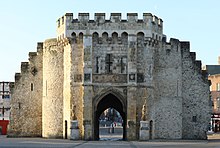
Southampton (/saʊθˈ(h)æmptən/ ) is a port city in Hampshire, England. It is located approximately 80 miles (130 km) south-west of London, 20 miles (32 km) west of Portsmouth, and 20 miles (32 km) south-east of Salisbury. Southampton had a population of 253,651 at the 2011 census, making it one of the most populous cities in southern England. Southampton forms part of the larger South Hampshire conurbation which includes the city of Portsmouth and the boroughs of Havant, Eastleigh, Fareham, and Gosport. A major port, and close to the New Forest, Southampton lies at the northernmost point of Southampton Water, at the confluence of the River Test and Itchen, with the River Hamble joining to the south. Southampton is classified as a Medium-Port City.
Southampton was the departure point for the RMS Titanic and home to 500 of the people who perished on board. The Spitfire was built in the city and Southampton has a strong association with the Mayflower, being the departure point before the vessel was forced to return to Plymouth. In the past century, the city was one of Europe's main ports for ocean liners. More recently, Southampton is known as the home port of some of the largest cruise ships in the world. The Cunard Line maintains a regular transatlantic service to New York from the city. Southampton is also one of the largest retail destinations in the South of England.
Southampton was heavily bombed during the Second World War during what was known as the Southampton Blitz. It was one of the major embarkation points for D-Day. In the Middle Ages Southampton was where troops left England for the Battle of Agincourt. It was itself raided by French pirates, leading to the construction of the fortified town walls, many of which still stand today. Jane Austen also lived in Southampton for a number of years. In 1964, the town of Southampton acquired city status, becoming the City of Southampton.
Some notable employers in the city include the University of Southampton, Ordnance Survey, BBC South, Associated British Ports, and Carnival UK. (Full article...)
Selected pictures
Selected biography
Alfred Thompson Denning, Baron Denning, OM, PC, DL (23 January 1899 – 5 March 1999), was an English barrister and judge. He was called to the bar of England and Wales in 1923 and became a King's Counsel in 1938. Denning became a judge in 1944 when he was appointed to the Probate, Divorce and Admiralty Division of the High Court of Justice, and transferred to the King's Bench Division in 1945. He was made a Lord Justice of Appeal in 1948 after less than five years in the High Court. He became a Lord of Appeal in Ordinary in 1957 and after five years in the House of Lords returned to the Court of Appeal as Master of the Rolls in 1962, a position he held for twenty years. In retirement he wrote several books and continued to offer opinions on the state of the common law through his writing and his position in the House of Lords.
Margaret Thatcher said that Denning was "probably the greatest English judge of modern times". One of Lord Denning's successors as Master of the Rolls, Lord Bingham, called him "the best known and best loved judge in our history". Denning's appellate work in the Court of Appeal did not concern criminal law. Mark Garnett and Richard Weight argue that Denning was a conservative Christian who "remained popular with morally conservative Britons who were dismayed at the postwar rise in crime and who, like him, believed that the duties of the individual were being forgotten in the clamour for rights. He had a more punitive than redemptive view of criminal justice, as a result of which he was a vocal supporter of corporal and capital punishment." However, he changed his stance on capital punishment in later life.
Denning became one of the highest profile judges in England in part because of his report on the Profumo affair. He was known for his bold judgments running counter to the law at the time. During his 38-year career as a judge, he made large changes to the common law, particularly while in the Court of Appeal, and although some of his decisions were overturned by the House of Lords several of them were confirmed by Parliament, which passed statutes in line with his judgments. Appreciated for his role as "the people's judge" and his support for the individual, Denning attracted attention for his occasionally flexible attitude to the common law principle of precedent. He commented controversially about the Birmingham Six and Guildford Four. (Full article...)
On This Day in South East England
5 June:
1916: Chatham-constructed HMS Hampshire sunk after hitting a mine. Lord Kitchener was among those killed.
Categories
Related portals
WikiProjects
Topics
Associated Wikimedia
The following Wikimedia Foundation sister projects provide more on this subject:
-
Commons
Free media repository -
Wikibooks
Free textbooks and manuals -
Wikidata
Free knowledge base -
Wikinews
Free-content news -
Wikiquote
Collection of quotations -
Wikisource
Free-content library -
Wikiversity
Free learning tools -
Wikivoyage
Free travel guide -
Wiktionary
Dictionary and thesaurus












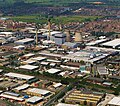
![Image 13 Credit: Michael Wilmore The Kent & East Sussex Railway was opened by Colonel H.F. Stephens, the railway engineer, in 1900. At its fullest extent, it ran nearly 22 miles[35km] from Robertsbridge on the Tonbridge to Hastings main line to Headcorn on the main line between Tonbridge and Ashford, Kent. More about the Kent & East Sussex Railway... (from Portal:Kent/Selected pictures)](http://upload.wikimedia.org/wikipedia/commons/thumb/2/2f/KentAndEastSussexRailway%28MichaelWilmore%29Oct2005.jpg/120px-KentAndEastSussexRailway%28MichaelWilmore%29Oct2005.jpg)
